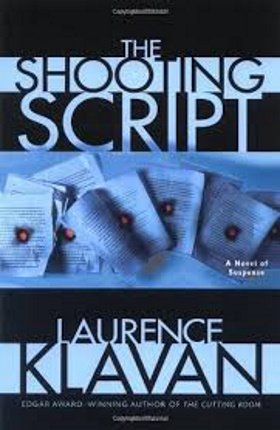“The scene in the car where Lana Turner and John Garfield kill her husband?” Johnny said. “That’s what we were doing. Only on bikes.”
There was a long pause, as I tried to take in both the information and the undercooked onion soup. Re-creating the scene meant I had been Cecil Kellaway, the pudgy, middle-aged character actor who played Lana Turner’s cuckold. I didn’t know whether to be offended, furious, or afraid. I felt a little bit of each.
I directed my attention to Johnny’s tight, black, rolled-up sleeve. His forearm held the scars of my defensive attack. There could be no doubt I’d heard them right.
“Look,” I said, suddenly famished, chewing on stale bread, “I don’t know what Graus likes. But I—”
“We considered doing From Here to Eternity,” Johnny said, pleasantly. “The love scene on the beach? Deborah Kerr, Burt Lancaster—and Philip Ober was the husband she cheated on.”
“There’s no murder in that,” Katie scoffed.
“That’s what I’m saying,” Johnny told her. “It would have been too much of an embellishment. So instead it was Postman.”
“Not the remake.” Katie giggled.
“That’s right,” he agreed. “We kept our clothes on.”
“Though it might have been Don’t Look Now. With the canals and all, in Venice? The last scene, with the—” Katie mimed a vicious stabbing.
“True, that’s true. That would have made me Donald Sutherland. And you the mad dwarf.”
“Julie Christie,” Katie shook her head.
“Mad dwarf,” Johnny shot back.
“You.”
“You.”
I found myself breaking in. “Did you know that Ian Holm replaced Donald Sutherland in The Sweet Hereafter?”
There was a pause, as each turned to me, slowly, from their flirting. Johnny smiled, politely.
“Yes,” he said. “I knew that.”
I said nothing else then. The meaning of the last film’s title—its intimations of the afterworld—unsettled me. The two had tried to kill me. Or, more specifically, Johnny had. Or was it all in fun?
Either way, it seemed a high price to pay for information about The Day the Clown Cried. If Graus had any, to begin with.
“Come on,” Johnny said, as if this were indeed my payment. “Let’s get you cleaned up and go see Graus.” He rubbed his clean chin. “Hey, how do you like my new look?”
Graus Menzies was running the SS. He stood in the center of the city’s huge flower market, surrounded by camera equipment, technicians, and other actors. Dressed in a Nazi uniform, he took a sniper’s gunshot to the chest, which exploded a squib hidden on him.
It was a movie called Beach Head, in which Nazis time-travel to the present and fight spring-break students. The actor was playing fifth banana to Wally Caking, a rubber-faced comic refugee from MTV.
—
Graus was having trouble with the timing of his scream, turn, and fall. Apparently, it wasn’t the first time that day.
“Cut!” an exasperated voice cried.
A young, moussed director flew out of a chair and started screaming at him in English. The actor, who was lying on the ground, took a while to find his feet. After he did, he painstakingly brushed himself off. The director continued to berate him. Graus waited for the guy to finish. Then he spat in his face.
“Uh-oh,” Johnny said, from our vantage point a few feet away.
The two began a vein-popping shriekfest, punctuated by American and German curses. It took four crew members to separate them. As Graus was led away, he yelled, “For Fassbinder, maybe! But not for you!”
Lunch was called. After being painfully stripped of his squib, Graus joined us, his chest heaving, sweat dripping from his face.
“When that video pig gets to hell, he’ll find me there,” Graus said.
“Chill out, Graus,” Katie said, agreeably.
Hearing that, I thought the actor would literally explode. Instead, disarmed, murmuring “Little boy and little girl,” he kissed and hugged Katie and Johnny. He was about to do the same to me, when he caught himself.
“Ucch,” he shuddered, and turned away.
Perhaps this wasn’t the best time to grill him on his past. “I’ll kill you before I tell you anything,” he had said, when he tried to eat me in the bar. Had that been anything but hyperbole? I would have been happy to find out later.
“When you get a minute, Roy here still wants to chat with you,” Johnny said, heedlessly. “It’s about The Day the Clown Cried.”
Graus looked at me. His heavily made-up face was the color of a polluted sunset. Fake bloodstains soaked the shirt beneath his uniform.
“Do you want more of what I just gave that director?” he shouted. “I told you I don’t want to talk! Store closed! Out of business!”
“Well, actually,” I said, uneasily, “you suggested that you would just rather see me dead before you—”
“Sorry! I can’t hear you! I’ve gone deaf!” Graus started doing a crazy parody of sign language.

























